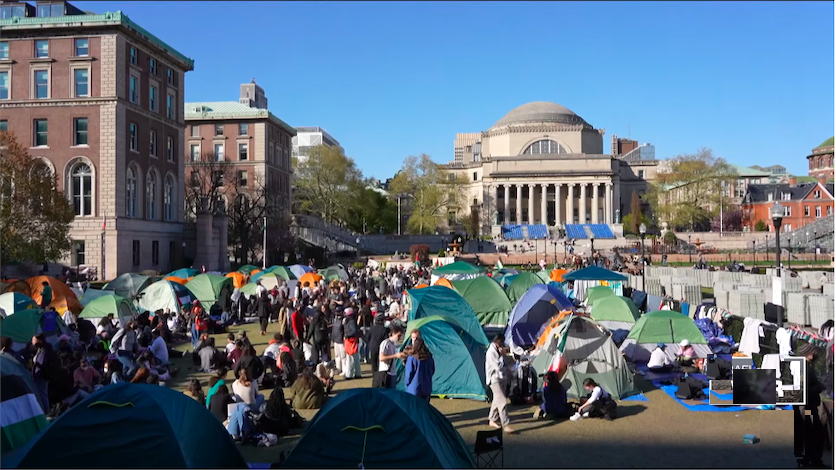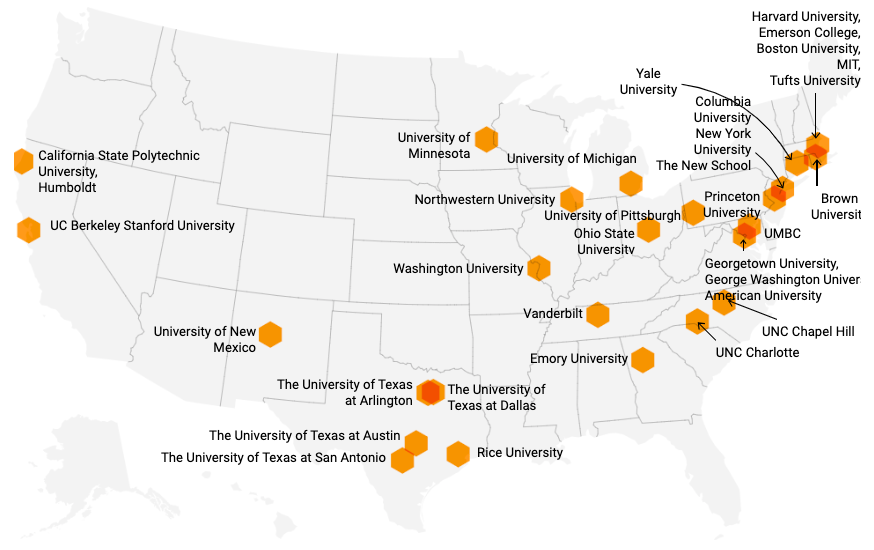Published 04/26/2024 00:19 | Edited 04/26/2024 07:47

Hundreds of professors at Columbia University, in New York, joined a mass strike on Monday (22) in protest against the decision of the school’s president, who ordered the arrest of students during a pro-Palestinian protest that took place last week. previous. The University, in turn, has negotiated deadlines for the camp to vacate the campus, which now has 48 hours. Violent repression with the arrest of university protesters has been constant in universities across the country.
The wave of pro-Palestinian protests sweeping college campuses across the United States has Columbia University at the epicenter of the solidarity movement. Protesters demand not only an end to the war in Gaza, but also concrete measures from the university, such as transparent disclosure of its investments and cutting ties with Israeli institutions.
The solidarity protest gained momentum as students set up protest tents on campus, reacting to police action that resulted in the arrest of more than 100 students last week. These students were also suspended by the university. Apparently, the authorities have not yet realized that they are pouring gasoline on the fire, as the crackdown and camps spread to elite universities.
As this Easter begins, this renowned Ivy League university finds itself in the midst of a crisis that has shaken not only its campus but has also reverberated across the country. It all started with an appeal from the rabbi associated with the school, who urged Jewish Zionist students (in favor of the occupation of Palestine by Jews) to remain at home, amid increasingly tense confrontations.
The atmosphere at the university reached a critical point, prompting Columbia authorities to take extraordinary measures, allowing students to attend classes virtually, starting on Monday, coinciding with the start of Passover, an important Jewish holiday. Even so, in the camps it is possible to see groups of Jews celebrating Passover with the protesters. There are those who compare what is happening with the protests against the Vietnam war in the late 1960s.
A cause for youth
Bassam Khawaja, a professor at Columbia Law School and supervising attorney for the school’s human rights clinic, expressed his dismay at the university president’s decision to immediately turn to the NYPD. He said there was no attempt to de-escalate the situation, despite the protest being described as non-violent.
As Columbia announced remote classes, students on U.S. college campuses launched their own protests. At Yale University in Connecticut, more than 40 pro-Palestine protesters were arrested by police. Nearly 60 people were arrested, including a press photographer, by law enforcement authorities at the University of Texas at Austin campus on Wednesday during protests. At Harvard, former university president Claudine Gay resigned in early January due to the protests, in addition to the suspension of the Palestine Solidarity Undergraduate Committee.

On Monday, Columbia President Nemat Minouche Shafik announced that school leaders would meet to discuss the “crisis.” Shafik also mentioned anti-Semitic language and intimidating behavior toward Jewish students on campus. The charge of prejudice and discrimination against Jews (anti-Semitism) is often used against protesters, although these also include anti-Zionist Jews.
However, student protesters, including Jewish students, vehemently denied accusations of anti-Semitism, attributing these allegations to “inflammatory individuals” and emphasizing that the protests were peaceful and inclusive. However, they also admit to incidents of conflict with pro-Israel individuals.
The Columbia and Barnard chapters of the American Association of University Professors condemned the crackdown on protests in a statement, expressing shock at the university leadership’s lack of defense of free speech.
Journalism professor Helen Benedict, who witnessed the police action on campus, described the response as exaggerated and a miscalculation at every stage.
The protests sparked national attention, with political leaders from both parties criticizing university leadership. President Joe Biden accused anti-Semitism on college campuses during a statement marking Easter.
At the event in Virginia, congresswoman Alexandria Ocasio-Cortez made reference to the protests, highlighting the importance of young people’s voices in building the country.
Israel’s disproportionate response
Tensions in Columbia have deep roots, exacerbated by the attack on Israel by Hamas on October 7. Since then, pro-Palestinian protests and concerns about the supposed rise of anti-Semitism have been a constant on campus. The situation escalated in recent days, culminating in clashes that prompted a response from the White House and New York authorities.
Rabbi Elie Buechler’s call for Zionist students to remain at home reflects growing concern about the safety of these students, given what he described as the inability of local authorities to ensure their protection. However, this recommendation was met with resistance from other Jewish Zionist groups on campus, such as Hillel, which called on the university administration and city authorities to ensure the safety of students on and around campus.
Clashes between pro-Palestinian protesters and Zionist students and their supporters resulted in arrests and an atmosphere of fear and tension. The response from local authorities and the White House, strongly condemning the alleged anti-Semitism and calling for calm, highlights the seriousness of the situation.
Meanwhile, protest organizers insist their actions were peaceful and that they are committed to solidarity and justice. However, reports of violence and clashes continue to emerge, further fueling controversy and fear among students and the wider community.
As the crisis unfolds, Columbia University finds itself at the center of a national debate about free speech, the right to protest and international solidarity. Meanwhile, students remain determined to make their voices heard, regardless of the consequences. The future of the university and the outcome of these protests remain uncertain, as negotiations continue and pressure continues to mount.
Source: vermelho.org.br

